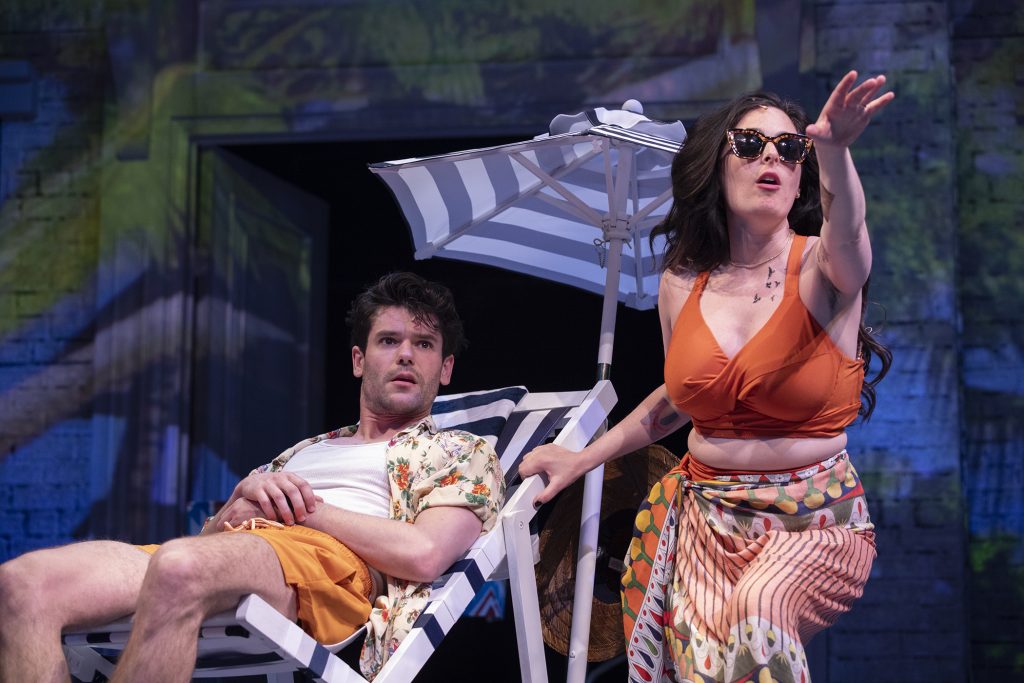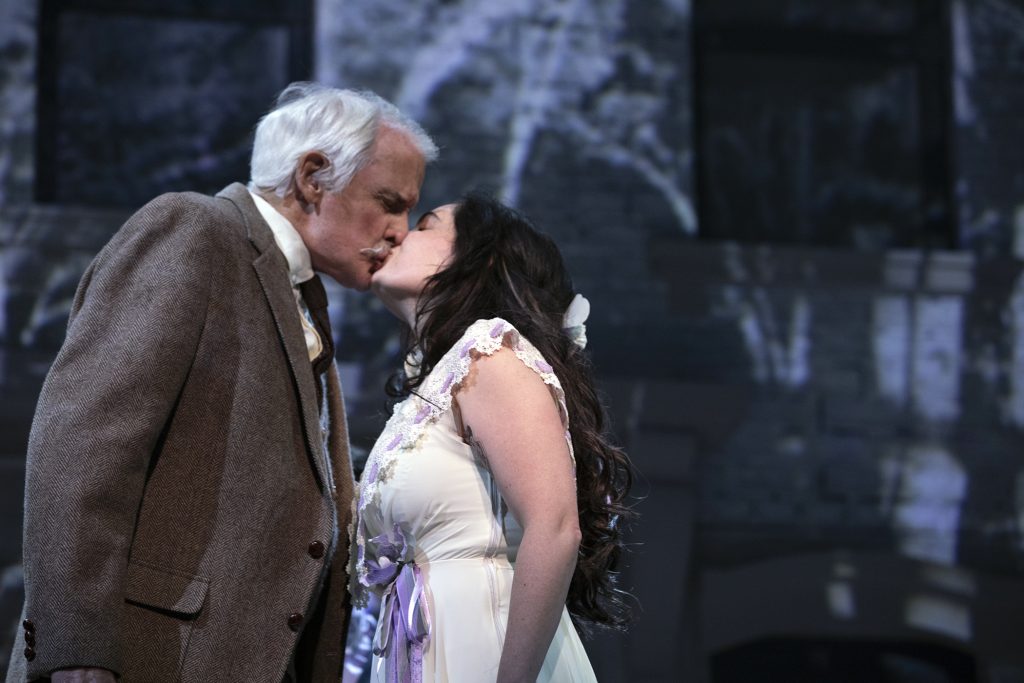
By Eric Marchese | Special to the NB Indy
In “Prelude to a Kiss, The Musical,” a random meeting that leads to romance is just the beginning of what evolves into a storyline right out of “The Twilight Zone.”
The all-new play is based squarely in the same romance-with-fantasy genre as the original “Prelude to a Kiss.” Both were written by Craig Lucas, and both were commissioned by South Coast Repertory.
The first time around was 1988 in a production that made its way to New York, with Alec Baldwin starring in the Broadway staging and the 1992 film version.
This time, the play’s creation, evolution and development have been more of a winding, circuitous road. That road has finally yielded the new musical version that’s now having its world premiere, directed by SCR artistic director David Ivers, as part of the company’s milestone 60th season.
As before, the focus of the story are Peter and Rita, young adults who appear in each other’s lives at just the right time. Peter (Chris McCarrell) works a non-descript office job, and Rita (Hannah Corneau), an artist working as a bartender.
The most striking aspect of the musical’s earliest scenes is the subtly low-key aura surrounding each of these twenty-somethings, neither of whom is especially jazzed about life.
A day after they first meet, Peter drops by the bar where Rita works. He quickly realizes she has been checking into his life and background, and his almost casual “let’s get married” is met with an equally nonchalant “OK.”
A focal point of both “Preludes” is the wedding. What should be a joyous occasion for all takes an unlikely turn when an elderly stranger named Julius (Jonathan Gillard Daly) approaches the couple at the altar and asks “May I kiss the bride?”
Everyone is too startled to react – but Rita says “yes,” and her lips lightly touch those of the old man. From that point on, the story takes a metaphysical turn that veers toward supernatural fantasy.
Anyone familiar with the non-musical “Prelude” (or the movie version of it) knows that the mysterious kiss somehow causes the old man’s spirit to take over Rita’s body while transferring her spirit into his creaky, aging frame.
What’s behind this isn’t explained until late in the play. However tenuous that revelation might be, it carries just enough plausibility to hold up.

“Prelude to a Kiss, The Musical” photo by Matt Gush, courtesy South Coast Repertory.
During the honeymoon, Peter begins to see alarming red flags signaling that Rita’s personality has undergone a radical shift: She’s in tune with the music and card games of an older generation. More bizarre is that though a bartender, she can’t identify even basic cocktail ingredients.
As in the non-musical version, playwright Lucas skillfully documents Peter’s growing realization that Rita is no longer the girl he fell in love with and married, and his attempts to understand and solve the mystery.
That, by the way, involves learning the identity of Julius and tracking him down – no easy feat, but one Peter is convinced is the key to getting the “real” Rita back.
If there’s a hitch to this retelling of the ’80s tale, it’s that, much to the show’s detriment, the Rita we first get to know isn’t palpably fearful of life. The audience needs more trepidation from Rita to contrast more with the “new” Rita who now fearlessly seizes the day.
By the same token, we need dashes of bravado in Peter to give us more of an opposites-attract dynamic. For now, this Peter and Rita are just too simpatico – and too similar.
Sean Hartley (lyrics) and Daniel Messé (music and lyrics) have created an essentially standard-issue score of 18 songs for what is more of a chamber musical as opposed to a full-blown, Broadway-style extravaganza. Unfortunately, not all the musical numbers are as compelling as we might have liked.
Rita’s parents (James Moye and Karen Ziemba) have two lightly enjoyable tunes clearly meant to provide comic relief to what is a fairly dark story. Taylor (Jimmie “J.J.” Jeter) and Angie (DeAnne Stewart), the protagonists’ best friends, are extraneous characters, which makes dispensable the musical numbers showcasing each.
On the plus side, Corneau and McCarrell are rightfully featured in nearly half the songs. The focal duo is eminently watchable, from the realistic frankness of Rita and Peter’s initial, achingly tentative moves toward becoming a couple through the post-wedding changes in Rita that bewilder Peter and on through to the musical’s utterly compelling conclusion.
Clearly the show’s standout, Corneau must be lauded for her performance as Rita from both vocal and dramatic standpoints, with an unforgettably haunting singing style and affecting acting that make her the production’s star.
“Prelude the Musical” also benefits from the characterizations of Julius Becker and his daughter Leah and the striking work of Daly and Julie Garnyé in those roles.
In the show’s closing minutes, Julius has two key songs. Singing with McCarrell, Daly gives us Rita’s persona as expressed through her uncomfortably “new” old-man body, then faces Corneau in her “Julius” persona as Rita and Peter try to duplicate the first kiss in hopes it will cause spirits to revert to their correct bodies.
In these last two scenes, Daly has more meaningful stage time – but so does Garnyé. Leah takes a crucial phone call from Peter, then delivers an achingly profound solo about dad Julius before a horrible medical prognosis consigned the entire family to despair.
The world premiere staging’s musical, production and design elements are impeccable – notably Wiley DeWeese’s music direction, Scott Davis’s scenic design, Yee Eun Nam’s projections and the on-stage work of a seven-piece orchestra.
Where you might find this new “Prelude” coming up short is in the way Peter and Rita react, in song, to what befalls them, and a sense that the full impact of this “Kiss” has yet to be fully realized.
Segerstrom Stage, South Coast Repertory, 655 Town Center Drive, Costa Mesa. Through May 4. Running time (including intermission): Two hours, 10 minutes. Tickets: $34 to $112. Purchase / information: 714-708-5500, www.scr.org.
